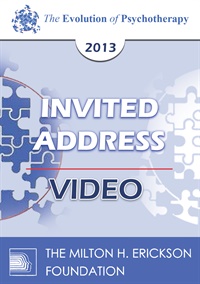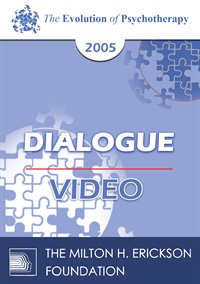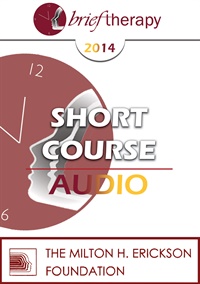
- Average Rating:
- Not yet rated
- Topic Areas:
- Short Courses | Multicultural | Existential Therapy | Brief Therapy | Meditation, Spirituality and Yoga
- Categories:
- Brief Therapy Conference | Brief Therapy Conference 2014
- Faculty:
- Naji Abi-Hashem, PhD
- Duration:
- 1:06:56
- Format:
- Audio Only
- Original Program Date:
- Dec 11, 2014
- Short Description:
- This short course reframes resilience as a cultural, communal and spiritual force rather than just an individual trait. Through stories, cross-cultural examples and practical questions, the presenter shows how people draw strength from heritage, community bonds, generational wisdom and meaningful relationships. Participants learn how to help clients reconnect with cultural identity, mobilize resources, and build resilience that supports adaptation, creativity and purpose in a rapidly changing world.
- Price:
- $15.00 - Base Price
- Average Rating:
- Not yet rated
- Topic Areas:
- Invited Addresses | Social Issues | Psychotherapy | Trauma
- Categories:
- Evolution of Psychotherapy | Evolution of Psychotherapy 2013
- Faculty:
- Mary Pipher, PhD
- Course Levels:
- Master Degree or Higher in Health-Related Field
- Duration:
- 1:06:21
- Format:
- Audio and Video
- Original Program Date:
- Dec 14, 2013
- Short Description:
- We’ll explore the deluge tidal of information, including a great deal of traumatic information about the fate of Mother Earth, that all of us are confronted with daily. I’ll share the steps of a trauma-to-transcendence cycle that begins with awareness, leads to resilient coping, and then continues to a transcendent response. This cycle always involves action and creates hope.
- Price:
-
Sale is $29.00
price reduced from Base Price - $59.00
Tags: Trauma Social Issues Psychotherapy
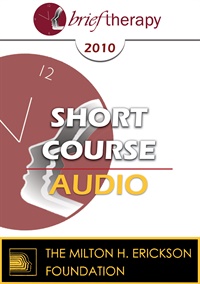
- Average Rating:
- Not yet rated
- Topic Areas:
- Short Courses | Brief Therapy | Multicultural | Social Issues
- Categories:
- Brief Therapy Conference | Brief Therapy Conference 2010
- Faculty:
- Naji Abi-Hashem, PhD
- Duration:
- 1:52:01
- Format:
- Audio Only
- Original Program Date:
- Dec 09, 2010
- Short Description:
- This wide ranging seminar looks at how globalization, secularism and rising fundamentalism shape the lives of clients and caregivers. The presenter explores identity, culture shock and the psychological fatigue created by rapid change, then offers ways to understand rigidity, polarization and radicalization without reducing them to pathology. Participants learn how to work more sensitively and flexibly across cultures, strengthen their own “cultural self” and support clients navigating loss, dislocation and shifting worldviews.
- Price:
- $15.00 - Base Price
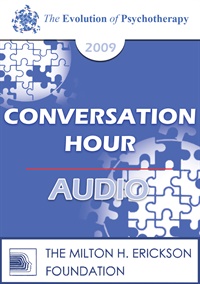
- Average Rating:
- Not yet rated
- Topic Areas:
- Conversation Hours | Psychotherapy | Family Therapy | Supervision | Systems Theory | Therapist Development
- Categories:
- Evolution of Psychotherapy | Evolution of Psychotherapy 2009 | Pioneers in Couples and Family Therapy
- Faculty:
- Salvador Minuchin, MD
- Duration:
- 1 Hour 6 Minutes
- Format:
- Audio Only
- Original Program Date:
- Dec 11, 2009
- Short Description:
- Minuchin outlines a culturally attuned assessment model that reframes pathology and engages family members as agents of change. He stresses the need to adapt language and technique across diverse systems, especially in cases involving single parents or suicidality. The talk critiques individual therapy’s limits and calls for a more systemic, inclusive approach to healing.
- Price:
- $15.00 - Base Price
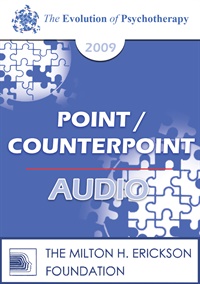
- Average Rating:
- Not yet rated
- Topic Areas:
- Point/Counterpoint Sessions | Psychotherapy | Social Psychology
- Categories:
- Evolution of Psychotherapy | Evolution of Psychotherapy 2009
- Faculty:
- Albert Bandura
- Duration:
- 1 Hour 24 Minutes
- Format:
- Audio Only
- Original Program Date:
- Dec 10, 2009
- Short Description:
- This session stages a searching exchange on moral disengagement, asking how ordinary people, institutions, and even helping professions drift into justifying harm. Through theory, case examples, and pointed critique, it examines dehumanization, responsibility, power, and the ethical blind spots that show up in war, corporations, media, mental health, and family systems. The dialogue challenges therapists and students to examine their own practices, rethink neutrality, and consider how psychological ideas can either protect human dignity or quietly erode it.
- Price:
- $15.00 - Base Price
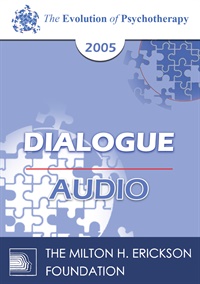
- Average Rating:
- Not yet rated
- Topic Areas:
- Dialogues | Social Issues | Psychotherapy
- Categories:
- Evolution of Psychotherapy | Evolution of Psychotherapy 2005
- Faculty:
- Mary Goulding, MSW | James Hillman, PhD
- Duration:
- 58 Minutes
- Format:
- Audio Only
- Original Program Date:
- Dec 09, 2005
- Short Description:
- Dialogue 02 from the Evolution of Psychotherapy 2005 - Politics and Therapy Featuring Mary Goudling, MSW, and James Hillman, PhD Moderated by Jon Carlson, PsyD, EdD
- Price:
- $15.00 - Base Price
- Average Rating:
- Not yet rated
- Topic Areas:
- Dialogues | Family Therapy | Psychotherapy | Narrative Therapy
- Categories:
- Evolution of Psychotherapy | Evolution of Psychotherapy 2005 | Pioneers in Couples and Family Therapy
- Faculty:
- Salvador Minuchin, MD | Michael White, B.A.S.W.
- Course Levels:
- Master Degree or Higher in Health-Related Field
- Duration:
- 1:00:10
- Format:
- Audio and Video
- Original Program Date:
- Dec 09, 2005
- Short Description:
- In this rare dialogue, Minuchin and White reflect on their respective journeys and shared values as therapists. They explore how narrative, relationship, and political context shape clinical work. With mutual admiration, they discuss craft, identity, supervision, and the importance of openness and continual skill-building in therapeutic practice. Moderated by Brent Geary, PhD
- Price:
-
Sale is $29.00
price reduced from Base Price - $59.00
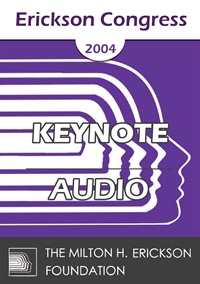
- Average Rating:
- Not yet rated
- Topic Areas:
- Keynotes | Psychotherapy | Ericksonian Hypnosis and Therapy Techniques | Managed Care | Systems Theory | Psychopharmacology
- Categories:
- Erickson Congress | Erickson Congress 2004 | Pioneers in Couples and Family Therapy
- Faculty:
- Cloe Madanes, HDL, LIC
- Duration:
- 53:36
- Format:
- Audio Only
- Original Program Date:
- Dec 02, 2004
- Short Description:
- This keynote traces the shift in psychotherapy from systemic approaches to the rise of managed care and psychopharmacology. It critiques profit-driven models and the overuse of medication, especially in cases involving children removed from families. Emphasizing the importance of family therapy and community involvement, it promotes ethical, value-driven practice and highlights success stories where systemic interventions led to lasting change.
- Price:
- $15.00 - Base Price

- Average Rating:
- Not yet rated
- Topic Areas:
- Short Courses | Ericksonian Hypnosis and Therapy Techniques | Hypnotherapy | Hypnosis | Social Issues
- Categories:
- Erickson Congress | Erickson Congress 2004
- Faculty:
- Halim Faisal, MSW | Diane Holliman, PhD
- Duration:
- 1:19:41
- Format:
- Audio Only
- Original Program Date:
- Dec 02, 2004
- Short Description:
- Hypnotherapy has been an under-used tool in social work. However, the principles of Ericksonian hypnotherapy are quite congruent with social work especially in serving at risk populations. Examples of how to use Ericksonian hypnotherapy and evaluate outcomes with at risk populations will be presented.
- Price:
- $15.00 - Base Price

- Average Rating:
- Not yet rated
- Topic Areas:
- Short Courses | Belief Systems | Brief Therapy | Ericksonian Hypnosis and Therapy Techniques | Religion
- Categories:
- Erickson Congress | Erickson Congress 2004
- Faculty:
- Naji Abi-Hashem, PhD
- Duration:
- 1:19:45
- Format:
- Audio Only
- Original Program Date:
- Dec 02, 2004
- Short Description:
- This short course offers a thoughtful psychological look at fundamentalism, radicalization and the forces that fuel violence in troubled regions. Blending cultural analysis with clinical insight, the presenter traces how fear, identity loss, trauma and rigid belief systems can pull individuals and groups toward extremism. Participants learn ways to understand these dynamics without reducing them to stereotypes and how clinicians can foster dialog, moderation, dignity and peacebuilding in communities shaped by conflict.
- Price:
- $15.00 - Base Price

- Average Rating:
- Not yet rated
- Topic Areas:
- Short Courses | Children and Adolescent Therapy | Ericksonian Hypnosis and Therapy Techniques | Abuse | Family Therapy | Social Issues
- Categories:
- Erickson Congress | Erickson Congress 2004
- Faculty:
- David Barnum | Wesley Crenshaw, PhD
- Duration:
- 1:19:45
- Format:
- Audio Only
- Original Program Date:
- Dec 02, 2004
- Short Description:
- Few cases are as difficult for therapists as those involving the intentional harm of one family member against another. This course provides participants the fundamentals of the model for treating family injustice developed by The Family Therapist Institute Midwest and presented in the new book, Treating Families and Children in the Child Protective System: Strategies for Systemic Advocacy and Family Healing. Didactic, participant discussion and videotape examples explain the model and its application.
- Price:
- $15.00 - Base Price
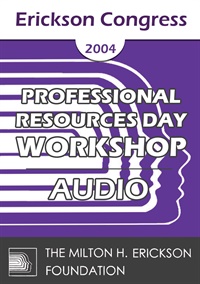
- Average Rating:
- Not yet rated
- Topic Areas:
- Workshops | Family Therapy | Social Issues | Psychopharmacology | Meditation, Spirituality and Yoga | Therapist Development | Ericksonian Hypnosis and Therapy Techniques
- Categories:
- Erickson Congress 2004 | Erickson Congress
- Faculty:
- Michele Ritterman
- Duration:
- 2:03:14
- Format:
- Audio Only
- Original Program Date:
- Dec 01, 2004
- Short Description:
- This workshop addresses everything from cruelty in families, to terrorism in politics and the abuse of psychopharmacology and managed care. It offers a higher order resolution method to all levels of human conflict and a model of human dignity.
- Price:
- $15.00 - Base Price
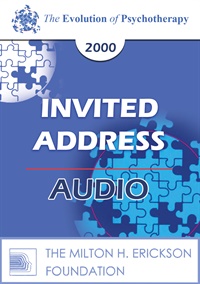
- Average Rating:
- Not yet rated
- Topic Areas:
- Invited Addresses | History of Psychotherapy | Therapy Practice
- Categories:
- Evolution of Psychotherapy | Evolution of Psychotherapy 2000 | Pioneers in Couples and Family Therapy
- Faculty:
- Jay Haley, MA | Otto Kernberg, MD
- Duration:
- 1 Hour 16 Minutes
- Format:
- Audio Only
- Original Program Date:
- May 29, 2000
- Short Description:
- This address traces key shifts in psychotherapy, from the rise of family and brief therapy to evolving views on the unconscious and client privacy. It addresses the tension between therapy as science versus art and considers its role in settings like corrections and foster care. The importance of ethical standards and clearly defining psychotherapy is emphasized. Afterwards there is a discussion, including Otto Kernberg offering commentary on what he calls Haley's oversimplification of therapy history.
- Price:
- $15.00 - Base Price
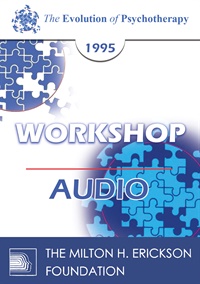
- Average Rating:
- Not yet rated
- Topic Areas:
- Workshops | Art and Creativity | Social Issues | Depression | Religion | Psychotherapy
- Categories:
- Evolution of Psychotherapy | Evolution of Psychotherapy 1995
- Faculty:
- James Hillman, PhD
- Duration:
- 2 Hours
- Format:
- Audio Only
- Original Program Date:
- Dec 14, 1995
- Short Description:
- This workshop is a phenomenology of melancholy. Jungian approaches to depression; clinical treatments, societal implications, resistances, suicidal risks and practical techniques will be demonstrated. The 50-minute, prizewinning BBC Documentary "Kind of Blue," narrated by the presenter will be featured.
- Price:
- $15.00 - Base Price
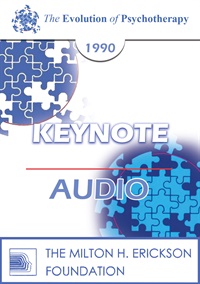
- Average Rating:
- Not yet rated
- Topic Areas:
- Keynotes | Community | Femininity | Gender | Masculinity | Social Issues | Psychotherapy
- Categories:
- Evolution of Psychotherapy | Evolution of Psychotherapy 1990
- Faculty:
- Betty Friedan
- Duration:
- 1 Hour 6 Minutes
- Format:
- Audio Only
- Original Program Date:
- Dec 16, 1990
- Short Description:
- The enormous changes brought about in the last 25 years by the women's movement and the sex role revolution have opened new possibilities and problems-sources of conflict and new strengths for women, men and families. There is a challenge now for psychotherapists to break through their own remnant stereotypes of feminine mystique, masculine mystique, and obsolete assumptions about family so that they may distinguish between personal and political pathology and help evolving women, men and families find and use more consciously their new strengths and confront real problems realistically.
- Price:
- $15.00 - Base Price
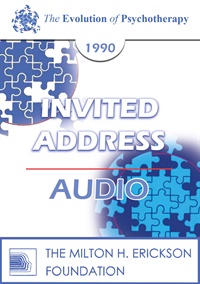
- Average Rating:
- Not yet rated
- Topic Areas:
- Invited Addresses | Addiction | Community | Social Issues | Psychotherapy
- Categories:
- Evolution of Psychotherapy | Evolution of Psychotherapy 1990
- Faculty:
- Thomas Szasz, MD | Rollo May, PhD
- Duration:
- 1 Hour 20 Minutes
- Format:
- Audio Only
- Original Program Date:
- Dec 15, 1990
- Short Description:
- Dr. Szasz will present a brief historical review of drug controls in the United States; a critical analysis of the transformation of the trade in drugs from a free market at the beginning of the century to a tightly statist system of controls today; and a market-oriented analysis of the "drug problem."
- Price:
- $15.00 - Base Price
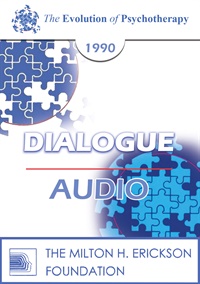
- Average Rating:
- Not yet rated
- Topic Areas:
- Dialogues | Social Issues | Psychotherapy
- Categories:
- Evolution of Psychotherapy | Evolution of Psychotherapy 1990
- Faculty:
- James Hillman, PhD | Thomas Szasz, MD
- Duration:
- 59 Minutes
- Format:
- Audio Only
- Original Program Date:
- Dec 14, 1990
- Short Description:
- Dialogue 06 from the Evolution of Psychotherapy 1990 - The Politics of Psychotherapy: Negative Effects and Intended Outcomes, featuring James Hillman, PhD, and Thomas Szasz, MD. Moderated by W Michael Munion, MA
- Price:
- $15.00 - Base Price
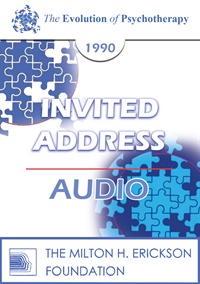
- Average Rating:
- Not yet rated
- Topic Areas:
- Invited Addresses | Family Therapy | History of Psychotherapy | Psychotherapy | Cultural and Social Contexts
- Categories:
- Evolution of Psychotherapy | Evolution of Psychotherapy 1990 | Pioneers in Couples and Family Therapy
- Faculty:
- Salvador Minuchin, MD | Mara Selvini Palazzoli, MD
- Duration:
- 1 Hour 26 Minutes
- Format:
- Audio Only
- Original Program Date:
- Dec 13, 1990
- Short Description:
- Minuchin reflects on how family therapy has evolved alongside shifting political and cultural tides. He contrasts early structural models with later constructivist approaches, noting how each reflects assumptions about power, class, and expertise. Using a case of a mother navigating child welfare systems, he illustrates the complexities of working with underserved families and calls for culturally responsive, socially aware interventions that don’t ignore systemic constraints.
- Price:
- $15.00 - Base Price


